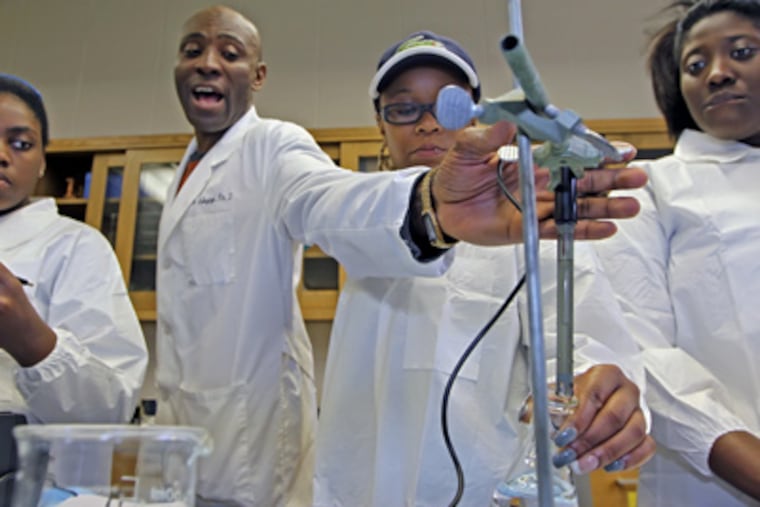Cheyney professor strives for grants to encourage minorities in math, sciences
On the campus of Cheyney University, a school that is no stranger to financial hardship, professor Adedoyin M. Adeyiga is a rainmaker.

On the campus of Cheyney University, a school that is no stranger to financial hardship, professor Adedoyin M. Adeyiga is a rainmaker.
The African-born chemistry professor, whose father is a king in Nigeria, has secured more than $5 million in grants for programming to increase minority participation in science, technology, engineering, and math (STEM). An additional $1.35 million is pending.
Adeyiga, or "Dr. A." as he is known on campus, works furiously to stop students from shunning a subject and career path that many consider scary and intimidating.
"It can be done," Adeyiga, 43, said. And the reward is "a better chance at getting a job than in some other [college] majors," he said.
The $5 million awarded since 2005 has been used to help establish scholarships, buy equipment, improve curriculum, hire faculty, and form relationships with other universities to give Cheyney students the chance to work in research labs across the region.
The programs have helped spur a growing number of the university's STEM alumni to go on to graduate school.
This has happened against a backdrop that finds the historically black college founded in 1837 striving to improve worrisome overall graduation rates. At the same time, building renovations and new construction are under way on campus, crucial programs were saved when the state restored some funding in the last budget season, and the Middle States Commission on Higher Education reaffirmed the school's accreditation in March, rescinding a warning it had issued in 2009.
Since shortly after joining the university, Adeyiga has secured grants of $2.5 million, $150,000, and $1.75 million from the National Science Foundation. The most recent grant - $1.75 million - was awarded in August. For Cheyney, a small school with about 1,550 students, the funding has provided a much-needed boost.
"They have made impressive gains in the numbers of students who majored and graduated and went on to graduate school," said Claudia Rankins, a National Science Foundation program director who manages grants for historically black colleges and universities.
Cheyney's STEM graduates have increased from 13 in 2005 to 24 in 2010, Rankins said. In 2006, 4 of 13 graduates went on to grad school. In 2010, 16 of 24 went on to graduate school, Rankins said.
For a school the size of Cheyney, "that's pretty good," Rankins said.
Three of the school's students - Lennan Boyd, Monica Effi, and Shawn Baylor - won first, second, and third place, respectively, in a recent regional student research conference.
In his office at the university, Adeyiga rarely sits still. Department chair Sakar Eva drops by, Adeyiga's daughter calls to tell him about her day, a colleague pokes his head in to grab Adeyiga for daily prayers (he's Muslim). Students drop in to ask questions.
"He makes sure you know your stuff," said Boyd, 20, a senior biology major. "He drills it into your head. If you want to learn, you learn. If you don't want to learn, you learn."
That relentlessness may come from Adeyiga's background.
He grew up as one of eight children in Nigeria, where his father is king of a village in Ogun state. In school, Adeyiga's high school chemistry teacher inspired him to study the sciences.
"He was hard-core," Adeyiga said. "He would assign 30 problems and then whisper in my ear to do 70."
Adeyiga moved to the United States to study when he was 19. He worked his way through undergraduate school at Christopher Newport University in Virginia, where one of his uncles, a professor, had settled. Adeyiga went on to earn his doctorate in inorganic chemistry from Virginia Commonwealth University in 1995. That year, he began an eight-year stint at Bennett College in Greensboro, N.C. He then taught at North Carolina A&T University for a year before joining Cheyney in 2004.
"I visited in 2004. And it looked old, with not a lot of equipment," Adeyiga said. "I thought I could make a difference and bring some money into the department. With money, you can do a lot of things."
Eva says the funding has brought an energy to the department that wasn't there when she joined the faculty 20 years ago.
She cites Adeyiga as one of several colleagues - including Steven Hughes, director of Cheyney's Aquaculture Research and Education Laboratory - who have brought substantial funding to the department.
"We didn't have to beg and beg and beg to the administration," Eva said.
In 2013, Eva and her STEM colleagues will have a new place to teach. Cheyney is slated to open a $27 million state-funded science building.
The faculty and students hope it will continue a pattern of growth. Adeyiga plans to do his part. He's spending his monthlong holiday break writing another grant application.